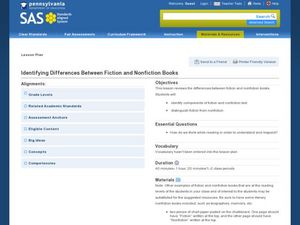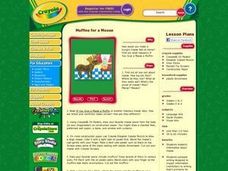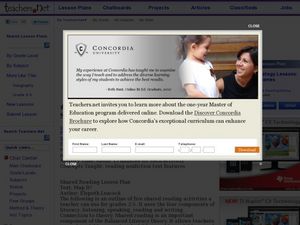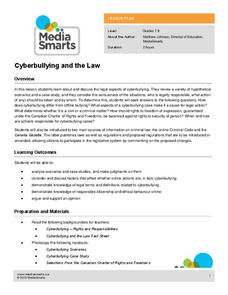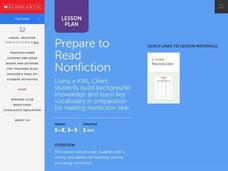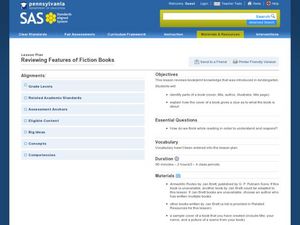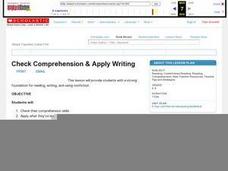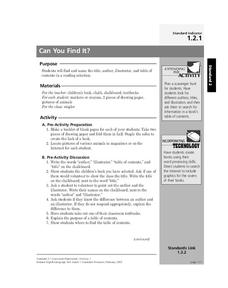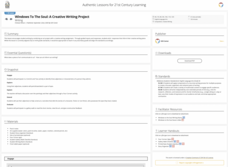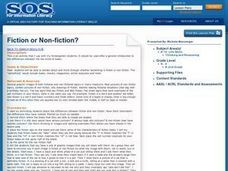Curated OER
Distinguishing Fiction and Non Fiction
Have your class go on picture walks of different books, and identify them as either fiction or non fiction and why. Working in groups, kindergartners state whether the book tells information or comes from the author's imagination. Use...
Curated OER
Lesson 1: Identifying Information in Nonfiction
If you are in need of a lesson on identifying information in a non-fiction text, look no further. The class learns how to use a KWL chart to identify explicit information in the book, Frogs by Gail Gibbons. They fill out the KWL...
Curated OER
Identifying Differences Between Fiction and Nonfiction Books
Students explore the differences between fiction and non-fiction book. For this genre study lesson, students read examples of fiction and non-fiction and identify the characteristics of each genre. Students list the characteristics on a...
Curated OER
Muffins for a Moose
Students research all the information they can about moose. After reading a book about the animal, they compare and contrast nonfiction and fiction books. To end the lesson, they use Crayola markets to draw their favorite scene from the...
Curated OER
Using Social Studies in Five Shared Reading Lessons: Geography
After several short 15-minute mini-lessons, your learners will gain an understanding of the characteristics of a non-fiction text. Using the book Map It by Elspeth Leacock, your class will become acquainted with non-fiction terms...
Curated OER
Researching the Past
Learners research the western movement in order to learn note taking strategies with nonfiction texts. They use the Internet to search for important information about the western movement using the Cornell Notes note-taking system. They...
Curated OER
Reintroduce: Main Idea
What would a main idea be without important details? Readers use a graphic organizer to record key details from an informational text (a fiction text would also work). Review main idea as a concept before beginning, asking scholars...
Curated OER
Non-fiction Book Report
In this book report worksheet, students fill in information about a nonfiction book. Students include the topic, 4-5 facts already know, 6 new words learned, and 5-6 things they learned about the topic. Students also write about the...
Media Smarts
Media Awareness Network: Hate or Debate?
Discuss the difference between legitimate debate on a political issue and arguments that are based on hate through a science-fiction scenario that shows how a controversial issue can be discussed in both ways. Then learn how purveyors of...
Curated OER
Comprehension Skills: Evaluate Using Fiction Stories and Aesop's Fables
Primary readers investigate several comprehension skills in the ten lessons of this unit. Forming opinions about stories, comparing stories to each other, using Venn Diagrams, and applying the ideas from a story to real life situations...
Curated OER
The Learning Network: Poetry Pairing July, 21, 2011
Although not a complete lesson plan, this set of emotionally powerful texts could be used in a variety of lessons. From The New York Times' Learning Network site, the resource includes a poem, an excerpt from a New York Times article and...
Media Smarts
Cyberbullying and the Law
Dealing with the very topical subject of cyberbullying, this lesson plan will surely create some engaged discussion in your classroom. Young learners discuss the laws concerning cyberbullying in Canada, and then respond to a series of...
Curated OER
Review of Literary Devices
Sixth graders review literary devices. They use both fiction and nonfiction texts to review metaphor, simile, alliteration, imagery, symbolism and personification. This lesson plan has a scripted guide for the teacher to follow.
Curated OER
Prepare to Read Nonfiction
Learners get an introduction to using KWL Charts as tools for reading nonfiction. They study unfamiliar words and share what they already know about the topic of the non-fiction selection and use this knowledge to help prepare to read.
Curated OER
Is It Moose-Mooses or Moose-Meese?
Students play librarian and have to shelve books on moose after determining whether the books are fiction or non-fiction. They must study Alaska and follow a format of questions to determine where to shelve the books.
Curated OER
Reviewing Features of Fiction Books
Students identify the features of fiction books. For this genre study lesson, students are introduced to the book Armadillo Rodeo and identify the cover, title, author, illustrator and title page. Students discuss how the book cover...
Curated OER
Check Comprehension and Apply Writing
Elementary schoolers practice the skill of non-fiction writing. They study aspects of the famous Leaning Tower of Pisa, and write an essay which describes the tower and it's fascinating history. The article about the tower is included in...
Curated OER
Irony in Poetry and Prose (Fiction and Non-fiction Texts)
Middle and high schoolers examine the impact of irony in poetry and prose. In this figurative language lesson, they read instructor-selected literature and identify uses of irony. Then they discuss how irony enhances literature.
Curated OER
Introduce Vocabulary: A Picture Book of Abe Lincoln (Adler)
The story of Abe Lincoln serves as the backdrop to this vocabulary-in-context activity as you read David Adler's A Picture Book of Abraham Lincoln. Scholars learn these politically themed words before listening to you read the story...
Curated OER
Can You Find It?
Plan a Parts of a Book scavenger hunt. Begin by giving your young adventurers a book, and asking them to find the title, author, illustrator, and table of contents. After a discussion of the purpose of each of these items, class members...
K20 LEARN
Windows To The Soul: A Creative Writing Project
The eyes have it in a project that combines art with creative writing. Class members list three adjectives or characteristics of a person they admire. Then draw a picture of a pair of eyes that they feel reflects these characteristics....
Curated OER
Analyzing Irony in Nonfiction
Young scholars examine the use of irony in non-fiction works. In this literature lesson, students read non-fiction war texts and explore the use of irony in the piece as they respond to discussion questions.
Curated OER
Fiction or Non-fiction
Third graders view three texts, A DAY IN THE LIFE OF A FOOTBALLER, THE HUMAN BODY, AND WHICH IS WHICH? with the titles covered. They discuss whether the books are non-fiction or fiction and try to come up with suitable titles for the books.
Curated OER
Literacy:Non-Fiction Stories
Third graders explore non-fiction stories. They follow along as the teacher reads a story. Students fill in words as the teacher reads to ensure they are following along. They discuss the text features found in the book and the features...
Other popular searches
- Genre Fiction and Nonfiction
- Fiction and Nonfiction Text
- Nonfiction and Fiction
- Fiction Nonfiction Books
- Fiction and Nonfiction Events
- Fiction vs Nonfiction Books
- Nonfiction Fiction
- Twinning Fiction/nonfiction
- Fiction or Nonfiction Unit
- Fiction vs. Nonfiction Books
- Fiction/nonfiction Books
- Identify Fiction Nonfiction


